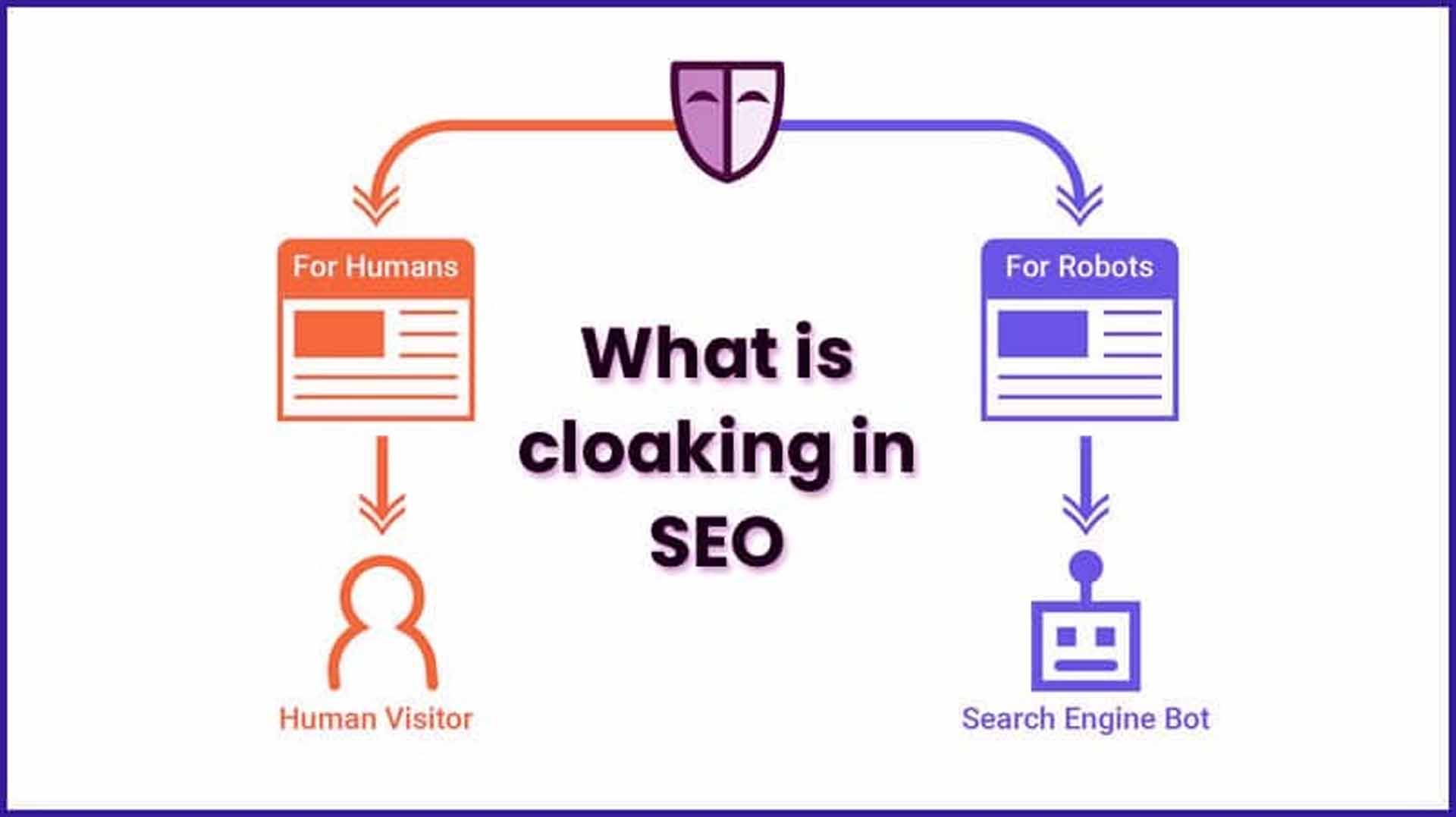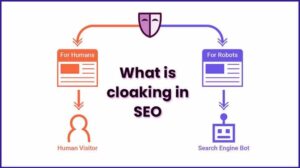SEO cloaking refers to the practice of presenting different content to search engines and website visitors in order to manipulate search engine rankings. It is considered an unethical SEO technique and is against the guidelines set by search engines like Google.
The purpose of SEO cloaking is to deceive search engines into thinking that a website is more relevant to a particular search query than it actually is. This is typically done by displaying different content to search engine bots than what is shown to regular users. The hidden content may be stuffed with keywords or optimized for specific search queries, giving the website an unfair advantage in search engine rankings.
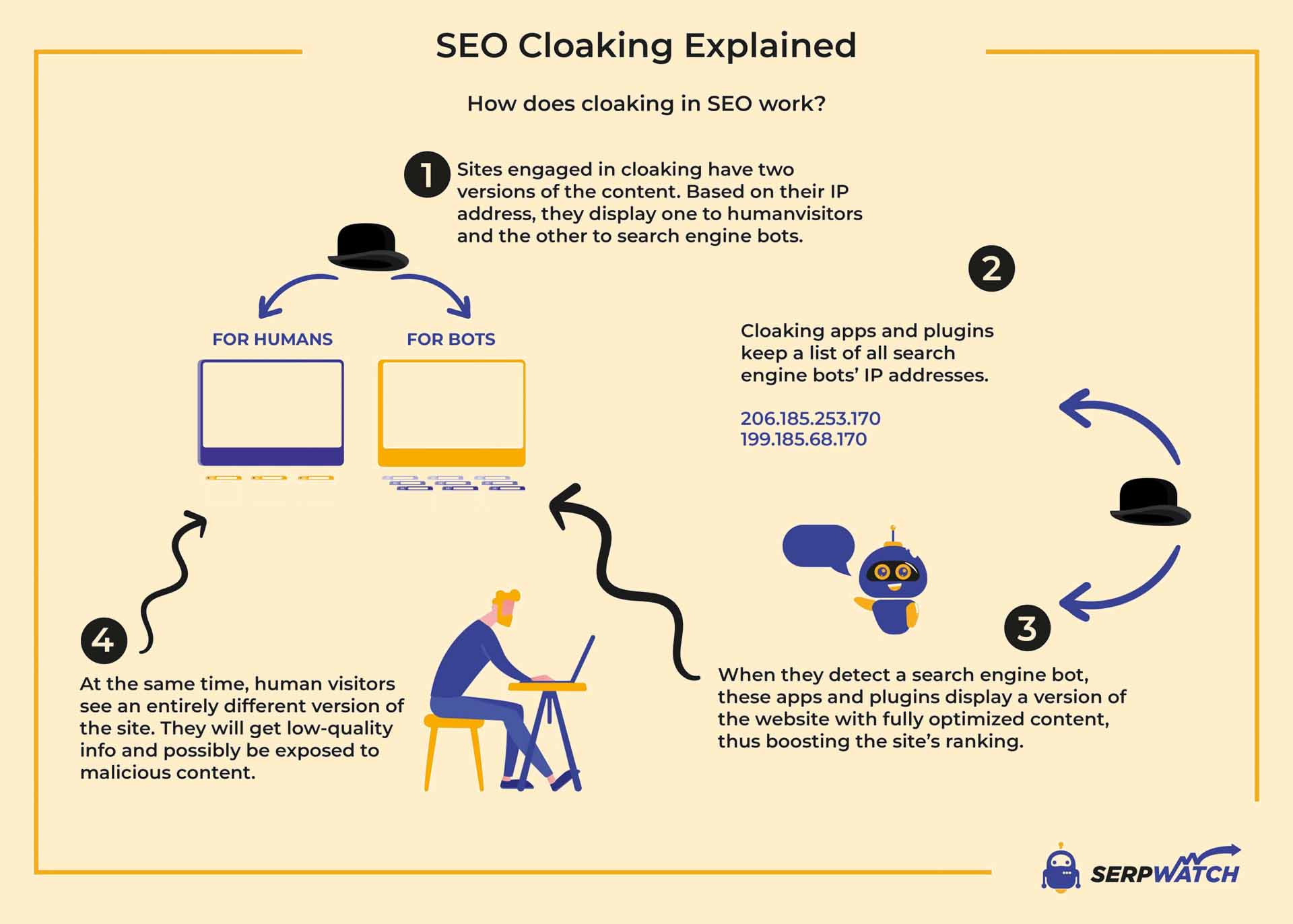
examples of common cloaking techniques
- IP-based cloaking
- User-agent cloaking
- User-agent cloaking
- JavaScript cloaking
- CSS cloaking
IP-based cloaking
The website detects the IP address of the visitor and serves different content based on whether it’s a search engine bot or a regular user.
User-agent cloaking
The website detects the user-agent string sent by the visitor’s browser, and if it matches a known search engine bot, it serves different content.
JavaScript cloaking
The website uses JavaScript to display content dynamically after the page has loaded, making it difficult for search engine bots to see the actual content.
CSS cloaking
The website uses CSS to hide certain elements from visitors but still make them visible to search engine bots.
Search engines take cloaking seriously because it undermines the accuracy and relevance of their search results. If a website is caught cloaking, it can face penalties, including being removed from search engine indexes altogether.
It’s important to note that cloaking is not a recommended practice for SEO. Instead, it’s best to focus on creating high-quality content that is relevant to your target audience and follows ethical SEO techniques.
what is seo cloaking ?
In SEO cloaking refers to the practice of presenting different content or URLs to search engine crawlers (bots) than what is shown to regular website visitors. It involves manipulating the content or code of a webpage to deceive search engines and gain an unfair advantage in search rankings.
The purpose of cloaking is to manipulate search engines into ranking the website higher by presenting optimized or keyword-stuffed content to the crawlers, while delivering a different user experience to regular visitors. It is considered a black hat SEO technique and is strongly discouraged by search engines.
Search engines like Google actively work to identify and penalize websites engaging in cloaking practices. If detected, a website can be removed from search engine indexes or experience significant drops in rankings.
To maintain a strong and sustainable SEO strategy, it’s best to focus on providing valuable and relevant content to both search engine crawlers and website visitors. Ethical SEO techniques, such as optimizing meta tags, improving site speed, building quality backlinks, and producing high-quality content, are more effective and align with search engine guidelines.
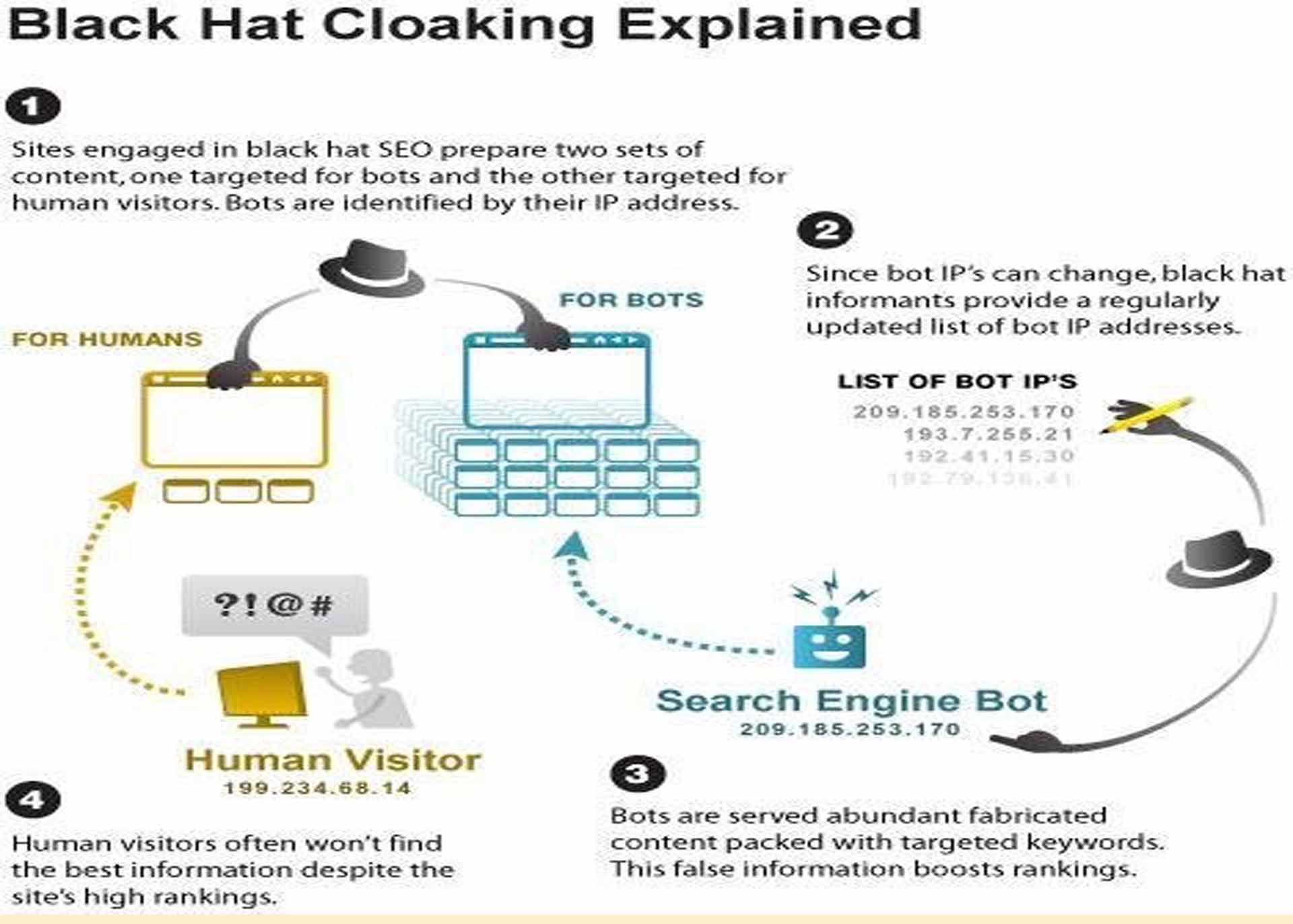
Motives behind Cloaking
The primary motivation behind cloaking is to manipulate search engine rankings by showing different content to search engine bots and regular users. Some common motives for employing cloaking techniques include:
Keyword stuffing
Cloaking allows website owners to stuff their hidden content with an excessive amount of keywords, aiming to improve their rankings for specific search queries.
Unrelated content
Websites may cloak to display content that is unrelated to their actual offerings but is optimized for popular or lucrative keywords, attracting traffic that may not be interested in their products or services.
Content manipulation
Cloaking enables websites to hide certain types of content, such as affiliate links, advertisements, or spammy elements, from search engine crawlers while showing them to visitors.
Evasion of penalties
In some cases, websites may employ cloaking to hide black hat SEO techniques, such as hidden text or links, from search engines to avoid penalties.
Search Engines’ Perspective
Search engines, such as Google, consider cloaking a violation of their guidelines because it undermines the accuracy and integrity of search results. They strive to provide users with relevant and trustworthy content, so they take active measures to detect and penalize cloaking practices.
Detection and Penalties
Search engines employ sophisticated algorithms and manual reviews to identify websites engaging in cloaking. If a website is caught cloaking, it can face various penalties, including.
Ranking demotion
The website may experience a drop in search rankings, making it less visible to users searching for relevant queries. Removal from search results In severe cases, search engines can completely remove a website from their index, making it virtually invisible in search results.
Manual actions
Search engine teams manually review websites, and if cloaking is detected, they can impose manual penalties, requiring the website owner to take corrective actions to regain their ranking positions.
Focus on user experience: Prioritize delivering valuable and relevant content to website visitors rather than attempting to deceive search engines.
Use appropriate on-page optimization techniques: Optimize meta tags, headings, URLs, and other on-page elements with relevant keywords to improve visibility without resorting to cloaking.
Build high-quality backlinks: Earn authoritative and relevant backlinks from reputable websites to enhance your website’s credibility and visibility.
Produce high-quality content: Create original, informative, and engaging content that satisfies users’ search intent, encouraging them to spend more time on your website and share your content with others.
By following ethical SEO practices and providing a positive user experience, you can improve your website’s visibility and rankings in a sustainable and long-term manner.
Cloaking techniques evolve
As search engines become more sophisticated in detecting cloaking, those who engage in cloaking techniques continually adapt their methods to avoid detection. This cat-and-mouse game between search engines and black hat SEO practitioners emphasizes the importance of search engines’ ongoing efforts to combat cloaking.
Cloaking is risky and unreliable: While some may argue that cloaking can provide short-term benefits in search rankings, it is a high-risk strategy. Search engines continuously improve their algorithms and detection methods, making it increasingly likely that cloaked websites will be penalized or removed from search results.
User experience and conversions suffer: Cloaking often results in a poor user experience. When visitors encounter content that differs significantly from what search engine results promised, they may feel deceived and frustrated. This can lead to high bounce rates, decreased engagement, and reduced conversions.
Negative impact on reputation and credibility: If a website is caught engaging in cloaking, it can severely damage its reputation and credibility. Users and potential customers may lose trust in the website, resulting in a loss of organic traffic and potential business opportunities.
Legitimate reasons for content variation: It’s worth noting that there are legitimate reasons for showing different content to users and search engines. For example, displaying a simplified version for mobile users or adapting content based on a user’s location. However, it’s important to implement these variations in a way that complies with search engine guidelines and ensures transparency.
What is Ethical SEO strategies
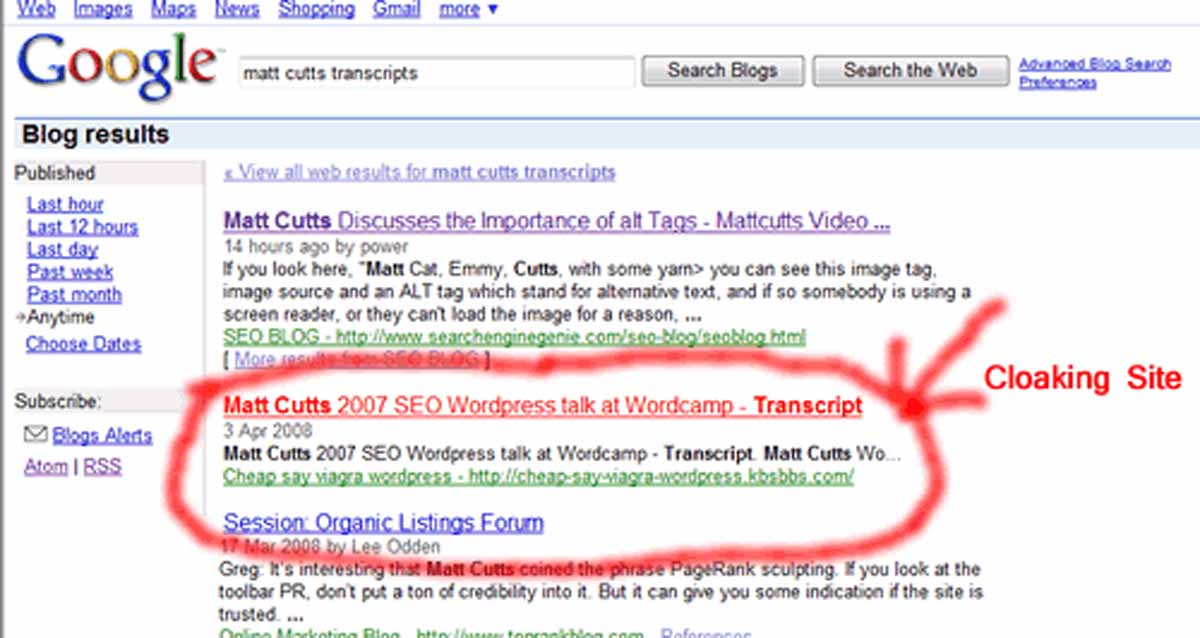
Instead of resorting to cloaking, focus on ethical SEO strategies that prioritize providing valuable content to users and optimizing your website for improved visibility. This includes conducting keyword research, optimizing on-page elements, improving site speed and user experience, building high-quality backlinks, and leveraging social media and content marketing.
Stay updated with search engine guidelines
It’s crucial to stay informed about the latest guidelines and best practices set by search engines like Google. Regularly review their webmaster guidelines to ensure your SEO efforts align with their recommendations and avoid any practices that could be perceived as cloaking or manipulative.
By adopting ethical SEO practices, creating valuable content, and prioritizing the user experience, you can build a sustainable and reputable online presence that attracts organic traffic and positively impacts your website’s visibility and conversions.
Can Cloaking be done in SEO?
Cloaking, as mentioned earlier, refers to the practice of presenting different content to search engine crawlers than what is shown to regular website visitors. It is widely considered an unethical SEO technique and goes against the guidelines established by search engines.
While it is technically possible to implement cloaking techniques, it is important to note that doing so is strongly discouraged and can have severe consequences. Search engines actively work to identify and penalize websites engaged in cloaking practices. If caught, a website may experience ranking demotion, removal from search results, or even manual penalties.
Cloaking is generally viewed as a black hat SEO technique and is not a recommended approach for improving search engine rankings or organic traffic. It can harm a website’s reputation, credibility, and long-term visibility in search results.
Instead, it is advisable to focus on ethical SEO strategies that involve creating high-quality, relevant content, optimizing on-page elements, building quality backlinks, improving user experience, and complying with search engine guidelines. These legitimate and sustainable approaches are more effective in the long run and help establish a strong online presence.
Permitted SEO Cloaking Practices.
Search engines like Google explicitly state that cloaking is against their policies and can result in penalties, including loss of rankings or removal from search engine indexes. They aim to provide users with accurate and relevant search results, and cloaking undermines this goal by manipulating the content presented to search engines.
To build a successful and sustainable SEO strategy, it’s best to adhere to ethical SEO techniques that prioritize user experience, high-quality content, and adherence to search engine guidelines. By focusing on creating valuable and relevant content, optimizing on-page elements, building quality backlinks, and improving user experience, you can improve your website’s visibility and rankings without resorting to cloaking.
Why Should You Avoid Cloaking in SEO?
Violation of search engine guidelines: Major search engines like Google explicitly state that cloaking is against their guidelines. Engaging in cloaking can lead to penalties, including a loss of rankings or removal from search engine indexes. It’s crucial to adhere to these guidelines to maintain a positive relationship with search engines and ensure long-term visibility in search results.
Risk of penalties: Search engines continuously update their algorithms and invest in technologies to detect and penalize websites employing cloaking techniques. If your website is caught cloaking, it can face severe penalties that negatively impact your organic search rankings and overall visibility.
Negative user experience: Cloaking often results in a poor user experience. When visitors encounter content that differs significantly from what was promised in search engine results, it can lead to confusion, frustration, and a loss of trust. This can result in high bounce rates, reduced engagement, and decreased conversions.
Damage to reputation and credibility: Engaging in cloaking practices can damage your website’s reputation and credibility. Users and potential customers may view your website as deceptive, leading to a loss of trust and reluctance to engage with your brand. This negative perception can be detrimental to your online presence and overall business success.
Short-term gains, long-term risks: While cloaking may provide short-term benefits in search rankings, it is a high-risk strategy. Search engines are continuously improving their algorithms and detection methods, making it increasingly likely that cloaked websites will be identified and penalized. The potential benefits of cloaking are outweighed by the long-term risks and negative consequences.
Ethical considerations: Cloaking is widely regarded as an unethical SEO practice. It undermines the principles of fairness, transparency, and providing accurate information to both search engines and users. Ethical SEO focuses on creating valuable content, improving user experience, and complying with search engine guidelines.
By avoiding cloaking and focusing on ethical SEO techniques, you can build a sustainable and reputable online presence that attracts organic traffic, engages users, and maintains a positive relationship with search engines.
Faq:-
Q: What is SEO cloaking?
A: SEO cloaking refers to the practice of presenting different content or URLs to search engine crawlers (bots) than what is shown to regular website visitors. It involves manipulating the content or code of a webpage to deceive search engines and gain an unfair advantage in search rankings.
Q: Why do people use SEO cloaking?
A: The primary motive behind SEO cloaking is to manipulate search engine rankings. By showing optimized or keyword-stuffed content to search engine bots, website owners aim to improve their rankings for specific search queries and drive more organic traffic to their site.
Q: Is SEO cloaking allowed by search engines?
A: No, SEO cloaking is against the guidelines of major search engines like Google. It is considered an unethical SEO technique that undermines the accuracy and integrity of search results. Search engines actively work to identify and penalize websites engaged in cloaking practices.
Q: What are the consequences of using SEO cloaking?
A: Websites using SEO cloaking techniques can face penalties from search engines. These penalties can range from a drop in search rankings to complete removal from search engine indexes. Additionally, cloaking can lead to a poor user experience, loss of trust, and damage to a website’s reputation and credibility.
Q: How do search engines detect SEO cloaking?
A: Search engines employ advanced algorithms and manual reviews to identify websites engaged in cloaking. They analyze various factors, such as user-agent strings, IP addresses, content consistency, JavaScript usage, and more, to detect inconsistencies between the content presented to search engines and regular visitors.
Q: What are some alternative strategies to improve SEO without cloaking?
A: Instead of using cloaking, it is recommended to focus on ethical SEO strategies. These include creating high-quality and relevant content, optimizing on-page elements, improving user experience, building quality backlinks, and adhering to search engine guidelines. These approaches help improve search rankings and maintain a positive online presence in a sustainable manner.
Q: Can cloaking ever be considered acceptable in certain scenarios?
A: No, cloaking is generally considered unacceptable in SEO. While there may be scenarios where websites may want to show different content based on factors like device type or user location, it is essential to implement these variations in a transparent and compliant manner, ensuring search engines and users have access to consistent and accurate content.
